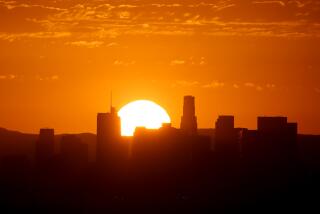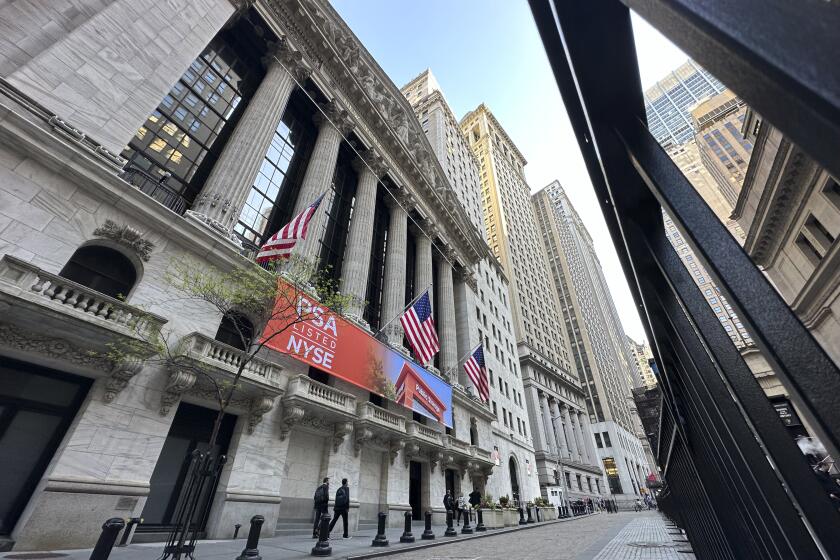State’s Economy Seems Unlikely to Dodge Fallout
California’s strong recovery from its economic plummet in the early 1990s survived the Asian flu financial crisis, the dot-com collapse and even this year’s rolling blackouts. But now the state’s eight-year business expansion finally appears to have met its match.
Amid the economic havoc created by the terrorist attacks, business forecasters increasingly are saying that California is joining the rest of the nation in sinking into a recession or near-recession. The severe damage to the nation’s travel and tourism industries means more trouble for the Golden State, where such linchpins of the economy as high-tech, agriculture and other businesses tied to international trade already had been suffering.
“A lot of businesses are suddenly facing tougher times. The airlines and related industries are getting all the press, but there can hardly be a business, except for security, that’s picking up,” said Richard C. Hartnack, vice chairman of Union Bank of California.
Some analysts believe that a downturn tantamount to a mild recession had descended on California even before the Sept. 11 attacks, largely because of the deep slump in Silicon Valley. Among the signs: the August unemployment rate, at 5.2%, was the state’s highest jobless level in more than two years.
But now, following the attacks, the damage is spreading around the state, rattling even the comparatively recession-resistant Southern California economy. Many nervous employers have put a freeze on hiring, or are laying off workers.
That’s particularly true in the travel and tourism industry. The industry, which by one broad standard accounts for 6% of California’s gross state product and employs more than 1.1 million workers, is in crisis.
Along with putting thousands of airline and hotel workers out of their jobs, the situation is hurting the owners and employees of a legion of related businesses, including restaurants, car rental agencies, florists and linen suppliers.
Stephen Levy, director of the Palo Alto-based Center for Continuing Study of the California Economy, predicted that the state’s industries could lose as many as 300,000 jobs before the downturn ends. In addition, he said, the state’s unemployment rate could rise to as high as 6.5% in 2002, up from a 32-year low of 4.5% early this year.
Levy and most other forecasters say the state--barring another terrorist attack or a new calamity--will recover starting early next year, preventing a deep recession. (Although there is no formal definition for a state recession, it normally is characterized by at least a half-year of shrinking economic output and declining employment.)
The latest blow to the California economy is being offset, at least somewhat, by businesses taking advantage of opportunities related to the terrorist attacks. Those businesses include resorts around the state wooing California vacationers who now want to stay close to home, as well as aerospace and high-tech companies shifting their focus to the nation’s security needs.
Levy noted that the state was hit far harder in the early 1990s, when it lost more than half a million jobs and unemployment climbed to 9.7%. “This is not 10% unemployment or the Great Depression,” Levy said.
Even so, that’s cold comfort for workers and business owners across a broad spectrum of California industries.
Consider, for example, the consequences of the changes in international trade.
California, the nation’s leading exporter, saw its businesses ring up $129.7 billion in foreign sales in 2000, up 20.7% over the previous year. The state of California estimates that 1.56 million jobs depend on trade, from dockworkers and truck drivers to cotton growers and manufacturers of computers and apparel.
Yet the Sept. 11 tragedies have prompted reassessments of everything from shipping procedures to immigration policies, raising questions about the prospects for businesses that rely on open borders. Long border delays have hurt California-based firms dependent on maquiladora factories in Mexico, the state’s top export market. Intensified border security also has slowed freight and passenger traffic into Canada, the state’s No. 3 export market.
The worst snags in the days after the terrorist attacks have eased. Cargo delays have dropped from 48 hours immediately after Sept. 11 to about 12 hours, according to Guy Fox, chairman of Global Transportation Services Inc., a Redondo Beach freight forwarder.
But stepped-up security checks and flight cancellations still create uncertainty. Global Transportation, which generally handles about 5,000 air and sea shipments a month, has seen a big decline in incoming shipments destined for retailers such as Mervyn’s and Target.
Airline shipping surcharges as high as 50 cents a kilogram, about 23 cents a pound, and other security-related expenses have raised the costs of shipping 15% to 20%, according to Fox.
Agriculture Faces Deepening Problems
In the likely event that the fallout from Sept. 11 undercuts demand worldwide, it deepens problems for such California industries as agriculture, which has struggled amid a global glut in some commodities.
At Salinas-based Tanimura & Antle, the nation’s leading independent vegetable grower, sales of lettuce and other vegetables to airlines, restaurants and hotels have fallen by at least 30% since the attacks, according to Ed Scurich, the firm’s director of food service. Scurich is, though, expecting a spike in sales of packaged salads, many of which are sold to supermarkets or take-out restaurants. “People want to get home and be with their families,” he said.
Still, those packaged salads will do no more than cushion the other losses.
For Silicon Valley’s slumping computer industry, the terrorist attacks resulted in a week of lost production at many companies, and it undermined already weak sales.
Palo Alto-based Sun Microsystems Inc. drew far fewer customers than expected to its unveiling two weeks ago of a new high-end server for running computer networks. Instead of selling new machines, Sun focused on restoring computer systems for customers whose operations were hampered by the attacks in New York.
The same post-attacks gloom that has reduced sales of computer equipment and software is hurting many other kinds of consumer spending. The volume of shoppers at stores in the five-county Los Angeles area was off 40% the weekend after the attacks, and was still down 10% to 15% last weekend, according to America’s Research Group, a market research firm in Charleston, S.C.
For California’s aerospace industry, the Sept. 11 attacks turned everything upside down. Businesses that were flying high in the commercial aircraft industry now face a nose-dive amid the terrorism-related decline in travel. But firms reeling from a decade-long entrenchment in defense spending are preparing for what could be the biggest military buildup in years.
The industry, though diminished from its heyday, still is one of the largest in California. It consists of 40,000 companies, ranging from small subcontractors with a handful of employees to Boeing Co.’s seven large facilities in Long Beach, Seal Beach and Anaheim, which employ thousands.
The most threatened are manufacturers that focus on supplying commercial aircraft makers such as Boeing and Airbus Industrie. Boeing, for instance, announced last month that deliveries of its jets are likely to drop by 25% as troubled airlines postpone or cancel orders. Of the 1,900 Boeing subcontractors worldwide, 500 are based in California.
“This is like the 100-year flood,” said David Goodreau, chairman of the Small Manufacturers Assn. of California, which represents about 1,000 companies, half in aerospace. “We’re going to see a dramatic increase in business failures.”
Yet for firms that perform both commercial and defense work, there are potential gains as well as losses.
Santa Ana’s Compass Aerospace, which makes wing and structural components for the Boeing 737 jet, said it expects a 30% to 35% drop in its commercial business.
But Compass, which has 750 employees, hopes to offset that decline by going after military contracts, including deals to make parts for C-5 and C-130 cargo planes as part of the nation’s anticipated defense buildup.
Another cornerstone of the California economy, the real estate business, also is being shaken by the slowdown and the loss of confidence stemming from the terrorist attacks. Home builders said orders for new homes fell in September, at least partly because of concerns raised by the attacks.
Some real estate agents in Southern California, where the market in recent months generally has avoided the chill that reached the Bay Area, also said buyers now appear more leery of taking on bigger mortgages.
Still, the state’s economy is down but not out. Much of the faith among business forecasters that the state will endure only a mild recession is based on the long-term track record of high-technology, Hollywood and international trade. Despite the current slumps in these sectors, they all figure to propel the state for years to come.
The devastating recession of the early 1990s was a glaring exception to the state’s usual pattern of quick recovery, and even that disaster yielded a benefit: It left heavily populated Southern California less dependent on aerospace and defense, and more balanced than ever.
Businesses Adapting to New Conditions
Even amid the current downturn and the gloom following the terrorist attacks, many businesses and consumers are adapting to new conditions or are seizing new opportunities. And California’s nearly 34 million residents are a powerful, built-in market for the state’s resorts, theme parks and other retailers and services.
So, even as travelers cut back on plans for long-distance trips, they are flocking to hotels in Santa Barbara. The Four Seasons Biltmore there, for example, was fully booked for this weekend and next, according to marketing director Edward Galsterer. He says the resort is on pace to sell out every Friday and Saturday through November.
“We did lose some group business in September and in October,” Galsterer said. “But our weekend business has remained strong because we’re such an ideal getaway for Southern California clients.”
Likewise, concerns about long-distance travel are prompting Hollywood studio executives to consider bringing production work back to the Los Angeles area, a development that could ease the problem of runaway production.
High-tech specialists in Silicon Valley and other parts of the state, much like their counterparts in the aerospace industry, have stepped up their marketing of high-tech security gear in response to terrorism-related anxieties.
For now, though, those business adjustments offset only a bit of the broadening economic downturn spurred by the events of Sept. 11.
Hotelier John Stoddard, general manager of downtown’s Wilshire Grand Hotel & Centre, said his hotel’s post-Sept. 11 strategy of aiming at bringing in more local and regional conventions instead of big national meetings is starting to pay off. The hotel, he said, “is booking business right and left, lots of small stuff.”
Still, he expects his hotel to be only 58% full this month, far down from the previously anticipated 78%. In September, it was only 45% full, versus a forecast 66%.
Hotel union leaders and the Los Angeles Convention & Visitors Bureau are even more worried. The bureau released a report Thursday projecting that Los Angeles County could lose $2 billion in spending and 41,000 tourism-related jobs, nearly 15% of its tourism-related work force, in the aftermath of the attacks.
Industry watchers say struggling downtown hotels have launched big layoffs of low-wage hospitality workers. The Hotel Employees and Restaurant Employees Union, with an estimated 40% of its membership in the county (or more than 3,500 people) already working reduced hours or laid off, is scrambling to set up food banks and other assistance.
Although the industry was feeling the effects of a slowdown before Sept. 11, the severity and suddenness of the recent plunge is unprecedented, hotel union research analyst David Koff said.
“We were like the guy who’s already stumbling who gets a big push that knocks him flat,” Koff said. “Things will eventually turn around. . . . In the meantime, how do people eat?”
*
Times staff writers Lee Romney, Peter Pae, Abigail Goldman, Meg James, Joseph Menn, Richard Verrier, Daryl Strickland and Jesus Sanchez contributed to this report.






